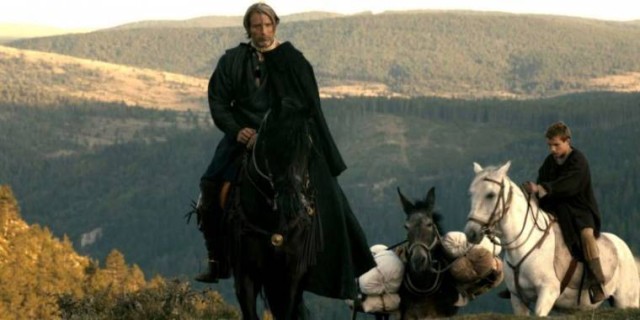 MADS MIKKELSEN, DAVID CROSS IN MICHAEL KOHLHAAS. Photo: Les films du LosongeRevolt in the forest
MADS MIKKELSEN, DAVID CROSS IN MICHAEL KOHLHAAS. Photo: Les films du LosongeRevolt in the forestThis is above all a hell of a good story and a true one, written up by Heinrich von Kleist in the 19th century (here transferred from a German to French setting). The film of it by the remarkable director of the 2003
Adieu,* Arnaud des Pallières, concerns a 16th- century horse trader (played by the also remarkable Mads Mikkelsen) who is forced by a unmannerly and brutal young Baron (Swann Arlaud), to yield up two fine horses as assurance when passing a border on his way to the horse market -- a practice that turns out no longer to be legal. When Kohlhaas comes to have the horses back he finds they have been badly mistreated, and his groom César (David Bennent), whom he left to care for the horses, has been set on by vicious dogs, he is outraged. He engages a lawyer (Jacques Nolot) to sue for damages in court and to have his horses returned in a healthy state. But the Baron has a friend in court and the case is rejected repeatedly. Next Kohlhaas'wife Judith (Delphine Chuillot), when about to petition Marguerite, Princess d’Angouleme (Roxane Duran), is murdered. Whereupon Kohlhaas turns rogue, shuts down his business, sells his property, and attacks with sword and crossbow with a small band of men which grows with volunteers (including Sergi Lopez with one arm and speaking Catalan) who hear of his activities. The young Baron and his companions flee and hide. Links with peasant revolts are suggested. When Kohlhaas' son and daughter (David Cross of
The Reader; Mélusine Mayance of
Sarah's Key), he learns his property is being held for him by his neighbor. Later a reform theologian (Denis Lavant of
Holy Motors) -- who in von Kleist's original Teutonic version is Martin Luther himself -- tries to argue Kohlhaas into dropping his campaign of personal justice.
The story and the film seethe with anger at injustice but Kohlhaas has become an outlaw, arguably fighting wrong with wrong. The violent tenor of the times is underlined by darkness, striking use of natural light, and a rich palette of natural sounds, animal cries, hoof beats, the soar of the wind, plus drums and bells. The wind may be a bit overdone at times.
Mike D'Angelo (for AV Club,
report from Cannes): "I was more impressed than most by Arnaud des Pallières’ work in the historical drama Michael Kohlhaas, starring Mads Mikkelsen as a 16th-century trader whose rigid principles lead to a guerrilla war when a Baron mistreats him and the law won’t support his case. It’s a staid, overly sedate film that every so often erupts with controlled intensity (most notably in a lengthy scene featuring the great Denis Lavant as an argumentative cleric), and one could argue that the highs wouldn’t be nearly as effective were they not offset by corresponding lows."
Des Pallières has constructed a brooding, slow epic, which was much the style of his quite different but memorable
Adieu; the slow burn intentional and not "staid, overly sedate" as D'Angelo says. Some simply don't like this director very much, it would seem and never will (note D'Angelo's being "more impressed than most"). In conventional mainstream "good film" terms as is clear from Jay Weissberg's scathing review in
Variety, this one (and probably also
Adieu) may seem poorly edited or too muted, restrained, tight-lipped. Others like myself find something uniquely haunting in his work. Even dissenters acknowledge the cinematography by Jeanne Lapoire sings here. All that said in the film's defense, it is a bit long, and it was also not as well reviewed by French critics as the more complex and innovative
Adieu.
Michael Kohlhaas, 122 mins., in French with brief moments of Catalan and German, debuted at Cannes in competition. It was written by Arnaud des Pallières and Christelle Berthevas with cinematography by Adrien Debackere and Jeanne Lapoirie. Music Box Films.
Allociné press and public rating was a moderately favorable 3.2 (but
Adieu got a 3.9). Screened for this review as part of the San Francisco Film Society's Nov. 2013 series, French Cinema Now, running from Nov. 7-10 at Landmarks's Clay Theater in San Francisco.
____________________
*[i]Adieu[/i['s French theatrical realease was in 2004, 8 Sept.





